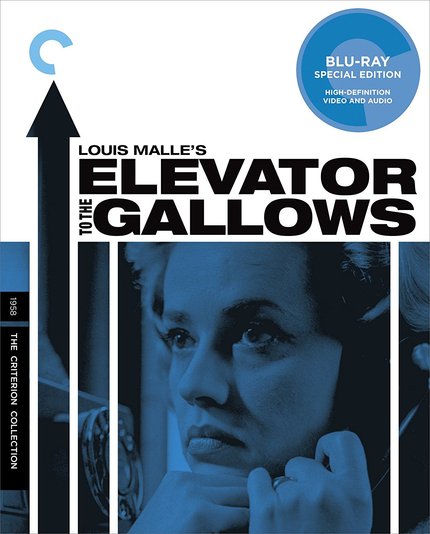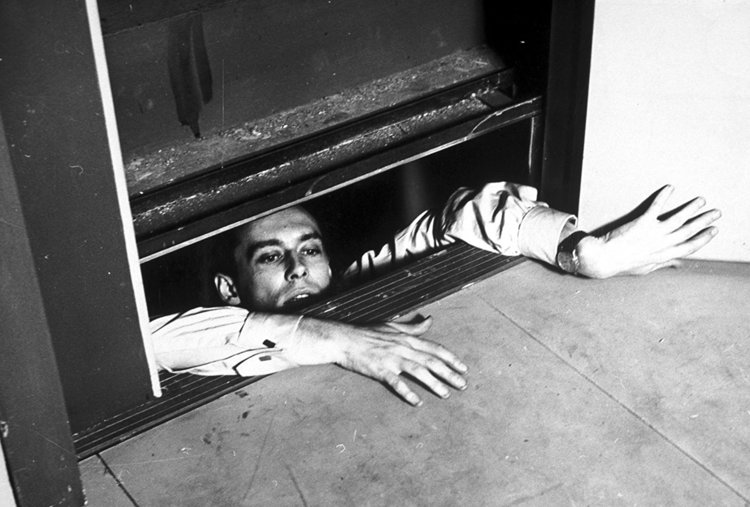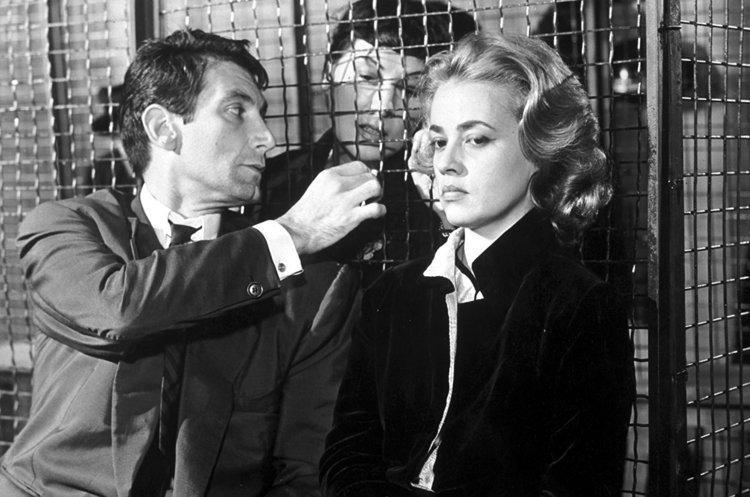Blu-ray Review: Criterion's ELEVATOR TO THE GALLOWS a Top Story, by Miles
Louis Malle's first film, starring Jeanne Moreau and scored by Miles Davis, is a classic French crime film.

The great Jeanne Moreau died July 31, 2017. She was an undisputed titan of World Cinema, a deep and dour, alive yet melancholy presence, ever unmistakable. Always elevating.
I say this here and now because I couldn’t at the time. I hadn’t seen Elevator to the Gallows. I knew enough to know, though, that any proper remembrance of Ms. Moreau must require the experience of her star-making performance. To eulogize her without that direct knowledge wouldn’t do, at all.
As essential as Elevator to the Gallows is in the Jeanne Moreau canon, it’s even more so for its director. It is the impressive first narrative film of Louis Malle, and, it must be said, it stands as one of the great debut directorial efforts of all time. Wrought from beginning to end in tension and surprises, Malle, as a fledgling filmmaker, never loses sight of the inner lives of his key characters while also always visually articulating every situation along the way. Rife with Moreau’s internal drama and the half baked detour with a Paris hoodlum and his dim gal, the taut 1958 French thriller is many things that defy its initial classification as a crime-gone-wrong flick.
Malle immediately breaks interesting ground by opening the film with a hushed, desperate, intimate exchange between two lovers, Florence Carala and Julien Tavernier (Moreau and Maurice Ronet). They, however, are not physically together in this moment, and nor will they be for quite some time. This Noir fate is theirs in spite of a best-laid plan to murder her terrible war-profiteering husband, and get away together once and for all. Julien conveniently works in the same stark office high rise as their target, making the killing all the more streamlined.
And so, with all t’s crossed and i’s dotted, so to speak, he flawlessly carries out his mission - unnoticed, undetected, and unfazed. He makes it to his happenin’ car which is parked right outside, ready to rendezvous forever with the newly widowed Ms. Carala. But then, a quick realization that he left a single piece of evidence dangling. No problem, he’ll just run back in, take care of it, come back out, and be on his way. Except then, the building’s electricity is routinely shut off for the weekend, leaving Julien trapped in the stopped elevator. Godammit.
It gets worse. The car is stolen by the aforementioned hoodlum couple (Georges Poujouly and Yori Bertin), who promptly cruise out of town to a lonely motel. Once there, they also manage to steal Julien’s identity, essentially framing him for their own bloody felonies. Will fate catch up to them as well, enabling whatever Bonnie & Clyde or Romeo & Juliet delusions they so clearly harbor?
It all leaves Florence wandering the streets alone, mentally awash in a sea of torrid possibilities as to why she was stood up by Julien (who remains trapped in that elevator). It’s these moments, scored most evocatively to the nocturnal trumpet of Miles Davis, that grant the film its transcendent quality. Rain and street light washes over her despondent face as we’re made privy to her internal dialogue of guilt and reckoning. It’s precisely the kind of thing that most other crime films would never allow this kind of time for, yet, here, it’s what makes so much of the difference. Elevator to the Gallows would simply not be the classic it is without Moreau’s character and her lonesome, jazzy walks.
Elevator to the Gallows is a perfectly executed array of emotional twists and narrative zags. It’s the rare movie that’s in some ways so fatalistic, it betrays it’s own fatalistic streak. Is it late late Film Noir or early early Neo-Noir? Is it early early French New Wave or a venerable bow of the old guard style? Where to classify its director, Louis Malle, anyway? Malle, after all, never made a film like Gallows again, yet it foreshadowed his career to come in numerous unexpected way.
A blu-ray upgrade on a 2005 DVD release, Criterion’s handling of Elevator to the Gallows is an all-around fine package. The extras cover all bases of interest, with archival video interviews with Moreau, Malle, Ronet and original soundtrack session pianist René Urtreger. Then, there’s a brief piece about how Malle managed to get the great Miles Davis to record this, his one and only film score. Music aficionados tend to know the title “Elevator to the Gallows” more as a landmark Miles Davis album, one that in fact marked a stylistic turning point in his career. The disc also includes a 2005 piece about the score, with jazz trumpeter Jon Faddis and critic Gary Giddins. A wacky student film by Malle called Crazologie is also here, plus a few trailers. The booklet gives us a great essay by critic Terrence Raffery and an interview with Malle.
Elevator to the Gallows is a beautifully photographed black and white movie, realized by the brilliant cinematographer Henri Decaë. Criterion proudly presents the film’s 2K digital restoration with the original monaural soundtrack, uncompressed. This is a Blu-Ray well worth owning.
Jeanne Moreau may be gone, as is Malle himself, but thanks to this release, we can always remember them as they, unlike the film’s characters, remained on the up and up.









